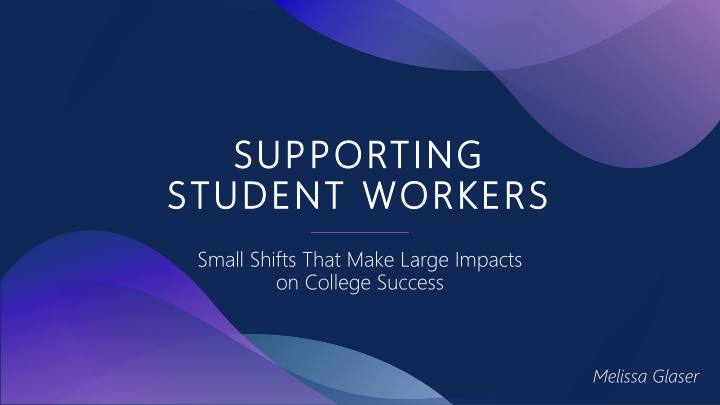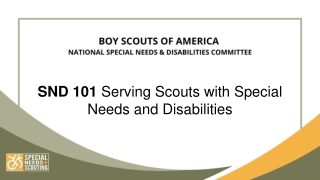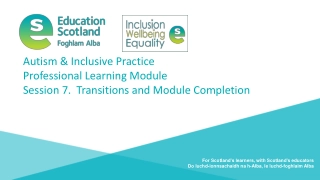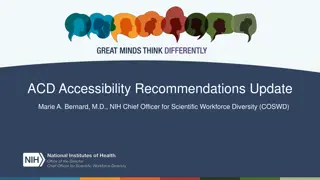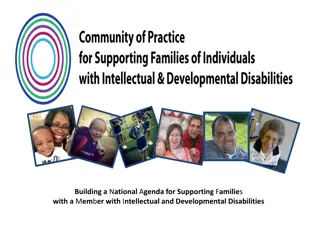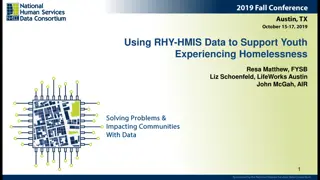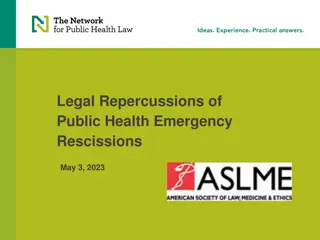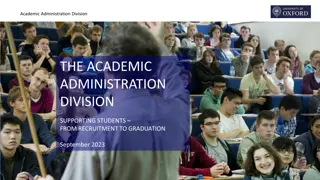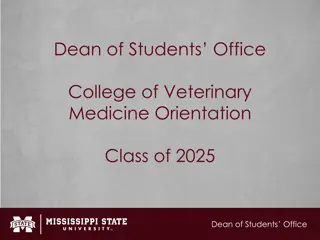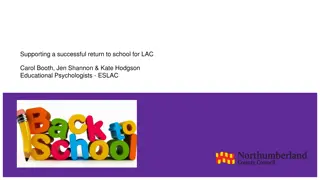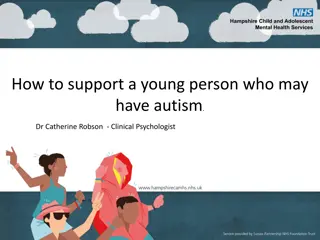SUPPORTING SUPPORTING
In this insightful presentation by Melissa Glaser, discover the significant impact of supporting student workers in higher education. Explore the challenges they face, why they need support, and valuable tips for supervisors. Gain a deeper understanding of the value of work and strategies for improving student outcomes through mindset shifts and design tweaks. With a focus on creating a supportive environment, this session emphasizes the importance of recognizing and addressing the unique needs of student workers.
Download Presentation

Please find below an Image/Link to download the presentation.
The content on the website is provided AS IS for your information and personal use only. It may not be sold, licensed, or shared on other websites without obtaining consent from the author.If you encounter any issues during the download, it is possible that the publisher has removed the file from their server.
You are allowed to download the files provided on this website for personal or commercial use, subject to the condition that they are used lawfully. All files are the property of their respective owners.
The content on the website is provided AS IS for your information and personal use only. It may not be sold, licensed, or shared on other websites without obtaining consent from the author.
E N D
Presentation Transcript
SUPPORTING SUPPORTING STUDENT WORKERS STUDENT WORKERS Small Shifts That Make Large Impacts on College Success Melissa Glaser
AGENDA o My Teaching & Supervising Experiences o Why Student Workers Need Support o The Value of Work o Shifts in Mindset, Behavior, & Course Design and Their Impacts on Students o Tips for Supervisors
MY EXPERIENCES Supervising oPeer Assistants (tutors) oLearning Assistants oRecruitment & Admissions Service Team Teaching oStudent success courses oIndividualized support for writing oEnglish courses oK-State First
CURRENT ROLES Engagement Coordinator, Office of Recruitment and Admissions Instructor for K-State First (Writing Life Connections Course)
Challenges Student Workers Face o Lack of positive support (unlike other busy students, e.g., athletes) o High demands on time o Full schedule between class and work o Less flexibility for studying at ideal/focused times o Last-minute work not due to procrastination but due to lack of time o May have more than 1 job and/or other commitments o May lack time for involvement in social or other activities o High stress o Financial stress o Work stress o Academic stress o Family and social stress o Constant shifting between environments and roles/tasks (mindset challenge, and for some, a social energy challenge)
Why Student Workers Need Support For what additional reasons do student workers need support? Please share your ideas in the chat.
Work may be necessary to obtain an education. o Supporting student workers is an issue of equity and accessibility to education, including many lower- and middle-income students and non-traditional students. o College is expensive! o In-state tuition/fees for 120 credit hours = $47,504 o Out-of-state tuition/fees for 120 credit hours = $113,392 o Estimated books/supplies for 4 years = $4,224 o Median cost for on-campus housing/dining for 1 year = $12,020 o Estimated off-campus housing/food for 1 year = $9, 392 Average estimated cost for 4 years (without any other expenses) = $101,316 for in-state students = $167,204 for out-of-state students Source: https://www.k-state.edu/sfa/cost/manhattan-campus-costs/undergraduate.html
Work may be necessary to obtain an education. Source: https://www.k-state.edu/cats-cupboard/about/
Work can be an integral part of a students eduation. o Additional Skills and Knowledge academics & career o Communication o Leadership o Self-awareness o Time and energy management through structure, consistency, and discipline o Preparation for real world through additional demands (keeping in mind that students may be busier than real world ) o Problem-solving skills o Critical thinking skills o Experience with diverse populations o Experience with software (e.g. CRM, MS Teams) o Experience with customer service in person/via phone o Other professional development, networking, and experiences
Work can offer support needed to obtain an eduation. o Social, Emotional, and Academic Support retention & success o Community, belonging, and social value o Relationships and decreased loneliness o Work as a third space (outside of school and home) may fill an important need for a student o Additional resources for students from supervisors and coworkers both directly and through referral o Sense of purpose, value, and contribution o On-campus jobs offer connection with other students, faculty, and staff along with convenience and flexibility o Off-campus jobs offer connection with the Manhattan/surrounding community
The Value of Work What additional value does work offer? Please share your ideas in the chat.
Shifts in Mindset, Behavior, & Course Design and Their Impacts on Students
SMALL SHIFTS 3 AREAS TO CONSIDER LARGE IMPACTS Mindset Behavior Course Design What are our attitudes and judgements about students working? How do we interact with students inside the classroom? How might our course requirements and expectations affect students? What knowledge and awareness do we have about students work experiences? How do we interact with students outside of the classroom? What policies work best for students?
Our mindset about work impacts our students. o Be aware that many students work, out of need and/or choice. o Value students work and recognize related benefits. o Remember that students have many commitments outside of class and value them all. o Trust that students who are busy are being responsible, too. o Realize that work schedules may be out of a student s control. o Recognize that students don t want special treatment; they need support that allows for success. o Ask questions, listen, and strive to understand. o Maintain high expectations so that students rise to meet them. o Provide motivation to catalyze perseverance and hard work. o Communicate your (supportive) views to students.
Our behaviors impact our students. o Be available to students. o Respond to emails (and tell them when to expect responses). o Offer office hours by appointment and/or offer many choices. o (Call them student hours. ) o Be approachable. o Actively encourage students to reach out. o Clearly communicate that you want to help them. o Present a friendly and open demeanor. o Remain open to questions and suggestions. o Get to know your students. o Ask students if they work, and show curiosity about their job. o Notice if a student misses class, changes behavior, and/or is struggling and then email/talk to them. o Relate class material and/or assignments to their work experiences.
Our behaviors impact our students. o Offer empathy and flexibility. o Accommodate reasonable requests when possible, and be proactive in offering flexible options to all students. o Communicate growth mindset so that students know that not only do you expect mistakes, you realize they are valuable for learning. o Recognize the impacts of work on a student s schedule and life. o Allow for a wide variety of engagement: o Offer students a pass when called on. o Recognize active listening as engagement. o Consider both introverts and extroverts. o Encourage students to relate work experiences to course content. o BRING FOOD TO CLASS.
Our course design impacts our students. o General Expectations and Goals o Consider the culture that exists in your department/field/class, and continually evaluate if that culture is best for students. o Ensure that expectations are known, accepted, and supported by students. o Set reasonable expectations and communicate them clearly. o Hold students accountable, remaining flexible when possible, and communicating acceptable ranges for meeting expectations. o Remember that students DO put academics first they just need flexibility and understanding so that they can succeed academically and in their work. o Course Materials o Avoid requiring expensive materials. o Help students access more affordable options and/or share materials. o Determine if a new edition of a textbook justifies the higher cost.
Our course design impacts our students. o Deadlines o Give students ample time to complete assignments, and provide clear, thorough, detailed instructions well in advance of deadlines. o Offer flexible deadlines, time/date ranges, and/or grace periods. o Offer extensions (proactively!) to everyone. o Remember the purpose of deadlines and make decisions accordingly. o Recognize that the real world has flexible deadlines too. o Ensure that you re available for questions before assignments are due. o Avoid having several assignments due at the same time/date. o Maintain a consistent deadline schedule for small/regular assignments. o With large assignments, consider having optional/flexible check-in assignments to help students stay on track and learn time management. o Attendance o Have a clear and reasonable policy so that students can plan. o Minimize out-of-class requirements and/or offer flexibility/alternatives.
Our course design impacts our students. o Assignments o Avoid assignments that may be busy work. o Consider both frequency and low/high stakes benefits/drawbacks in terms. of students time management and stress levels. o Consider contract grading and/or choices in assignments. o Provide options that relate to what students are already doing at work. o Group Projects o Consider alternatives unless necessary or if the benefits outweigh the cost. o Keep groups smaller (scheduling needs). o Give time in class for communication and/or working. o Avoid requiring out-of-class meetings at specific times. o Check in with groups to ensure all members are contributing. o Give students the opportunity to share feedback about group members. o Consider individual grades (rather than group grades).
Shifts in Mindset, Behavior, & Course Design What additional shifts in these areas might help students? Please share your ideas in the chat.
Small Shifts Big Impacts oAcademic success oStudent retention and graduation oCareer preparation oBetter relationships with students oLowered stress and improved mental health oIncreased motivation oFramework catalyzes possibilities for success oReinforces wholistic approach oSupports all students, not just student workers
Impacts on Students In what additional ways might small shifts make large impacts on students? Please share your ideas in the chat.
If you supervise student workers: o Communicate that academics are top priority. o Set schedules based on classes, exams, studying, etc. o Share schedules well in advance for planning purposes. o Allow students to study at work (when possible). o Honor requests for time off within a clear attendance policy. o Create a supportive environment. o Build community, allow socializing, and encourage friendships. o Recognize that work limits time for other social needs (family, friends, community, rest, alone time, etc.). o Know your students well (professionally, academically, and personally), and recognize differences in values and needs. o Provide support and constructive feedback. o Provide professional development for the job and for their futures. o Approve raises and additional work shifts (if helpful to students). o PROVIDE FOOD AT WORK.
Tips for Supervisors What additional tips might supervisors implement to support student workers? Please share your ideas in the chat.
3 KEY TAKEAWAYS Value students work experiences. Be flexible. Keep high standards and offer support proactively.
THANK YOU! Melissa Glaser msg@ksu.edu Office of Recruitment & Admissions Engagement Coordinator
